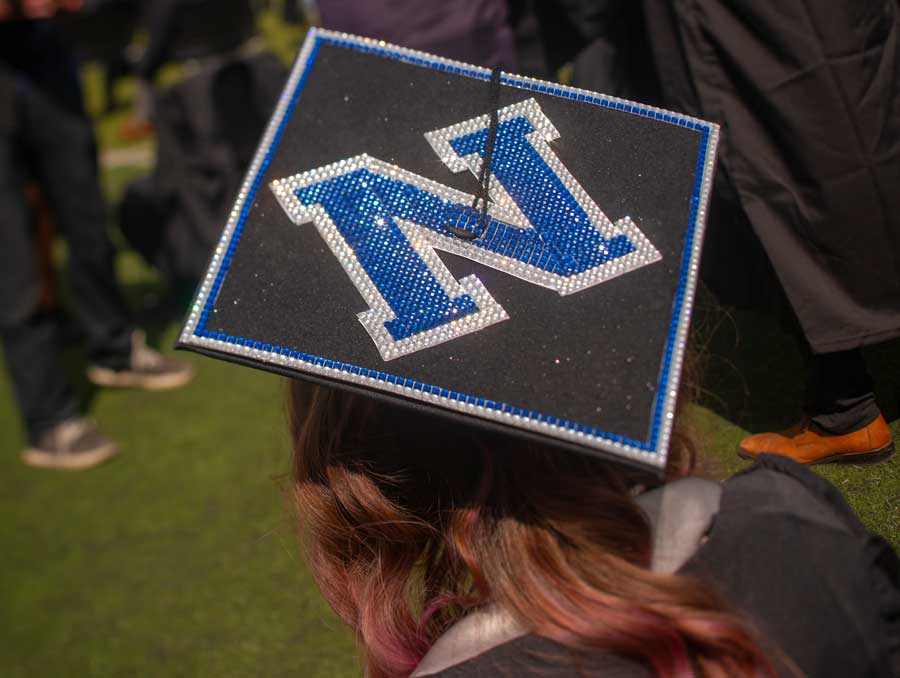Congratulations! You’ve made it to the end of your senior year in high school. One part of you is totally excited and ready to celebrate. The other part of you is a little freaked out wondering if you’ve got everything ready to start college next year.
To help you out, we’re answering some of the most frequently asked questions from graduating high school seniors.
Do I need to send the Office of Admissions anything else after I’m admitted?
Don’t forget to send your final high school transcript. This transcript can be requested from your high school’s registrar and it should list your official graduation date on it.
You’ll also want to make sure your vaccinations needed for college are up-to-date. Some of your vaccinations may have expired, while you may be taking others (like the one for meningitis) for the first time.
If you want to double-check that you're all set, visit our admitted students checklist and make sure you've completed each item.
Is my financial aid ready for next school year?
Students pay for college in a lot of different ways like University scholarships, external scholarships (from organizations other than the University), grants, loans, 529 plans, etc. Keep an eye on each of these throughout the summer to make sure they’re ready for the school year.
- University scholarships and/or grants: Some colleges require you to accept scholarships and grants awarded to you, while other schools do not. Check your university student account to see which of these scenarios applies.
- External scholarships: If you’re receiving a scholarship from an outside company or organization, find out how they will be sending the money. Organizations will often your award in one of two ways: 1) Directly to your mailing address or 2) Directly to the University. If the scholarship will be sent directly to the University, you’ll need to provide the scholarship organization the address to send it to. Make sure the scholarship organization puts your name and your university student ID number on the check so it’s matched correctly to your account.
- Loans: If you are new to getting a student loan through FAFSA, there are two important things you’ll need to complete: 1) Master Promissory Note and 2) Entrance Counseling. Both can be completed at studentaid.gov. Get them done as soon as possible.
- 529 plans: If your parent(s) started a 529 college savings account for you, now is the time to find out how much it will cover for the next year. You’ll work with both the 529 servicer and the university’s cashier’s office to make sure the money is added to your student account correctly.
When will I get my dorm room assignment? And, what should I bring?
Most colleges will assign you to a room in the summer. Your room assignment will show which hall you’ll live in, your room number and your roommate(s). Be sure to connect with your roommates during the summer. Most residence halls will allow students to bring a microwave and mini fridge, so you’ll coordinate with your roommates who will bring what.
What else should you bring? Well, most college rooms are equipped with a desk and chair, closet, and bed, but you’ll probably need a few more things. Common items to brings include sheets, pillows and pillowcases, and blankets, soap, shampoo and conditioner, washcloths and towels. But don’t forget shower shoes, a hamper, hangers, and laundry detergent. Take a look at our list of recommended items to bring on campus.
How does Orientation, registering for classes and getting books work?
Each university has a different process for registering students in classes. At the University of Nevada, Reno, we begin registering new freshman for classes starting January of their senior year in high school. Students complete the advanced registration steps in MyNEVADA to get the process started. Then, in the summer, our students attend Orientation where they meet with academic advisors and go over requirements for their degree. After completing Orientation, new freshmen have the chance to add and drop classes or rearrange their schedules for the rest of the summer.
Once you have a class schedule you can start looking for your textbooks by using the textbook search on the Nevada Wolf Shop website. If a book is marked as "required," is it a must for the class. Other books may be listed as optional. If you are on a budget, don't forget to look for used books, and consider renting books instead of purchasing them.
How to do I get a job on-campus?
Universities have both regular student jobs and work-study student jobs. Students that qualify for work-study (through the financial aid office) can apply for either type of jobs. Students that do not qualify for work-study can still apply for regular on-campus student jobs.
Most students begin searching for on-campus student jobs during the summer before they start college, and most jobs do not require experience. Some job titles can seem intimidating, but remember, we know you’re a student and here to learn. Don’t be afraid to apply for jobs that you’ve never done before, it might be your opportunity to grow. Check out our online job board to find on-campus openings.
How do I get involved on-campus?
Here, at the University of Nevada, Reno, we start the year off with Wolf Pack Welcome filled with activities for you to get to know others and get involved. From our annual opening ceremony to BBQs and block parties, it’s your chance to immerse yourself in college life. Don’t forget to attend the club fair, where you’ll meet with members from a variety of clubs, organizations and activities. Want to explore our clubs and organization now? Check them out at the Associated Students of the University of Nevada, or ASUN, website.
So, there you have it. Six things you should know before starting college this fall. We’re excited to have you join the Wolf Pack Family!
 Jeanette Chan-Rivera, M.S. is the Manager of Recruitment and Marketing at the University of Nevada, Reno. Over the last 15years, Jeanette has worked with hundreds of families navigating the admissions, financial aid and college readiness process. Her work also includes marketing and communication on behalf of the University’s Office for Prospective Students.
Jeanette Chan-Rivera, M.S. is the Manager of Recruitment and Marketing at the University of Nevada, Reno. Over the last 15years, Jeanette has worked with hundreds of families navigating the admissions, financial aid and college readiness process. Her work also includes marketing and communication on behalf of the University’s Office for Prospective Students.
Request more info
Do you have more questions we can answer? Are you interested in receiving additional information about the University, the admissions process, applying, financial aid or more?
